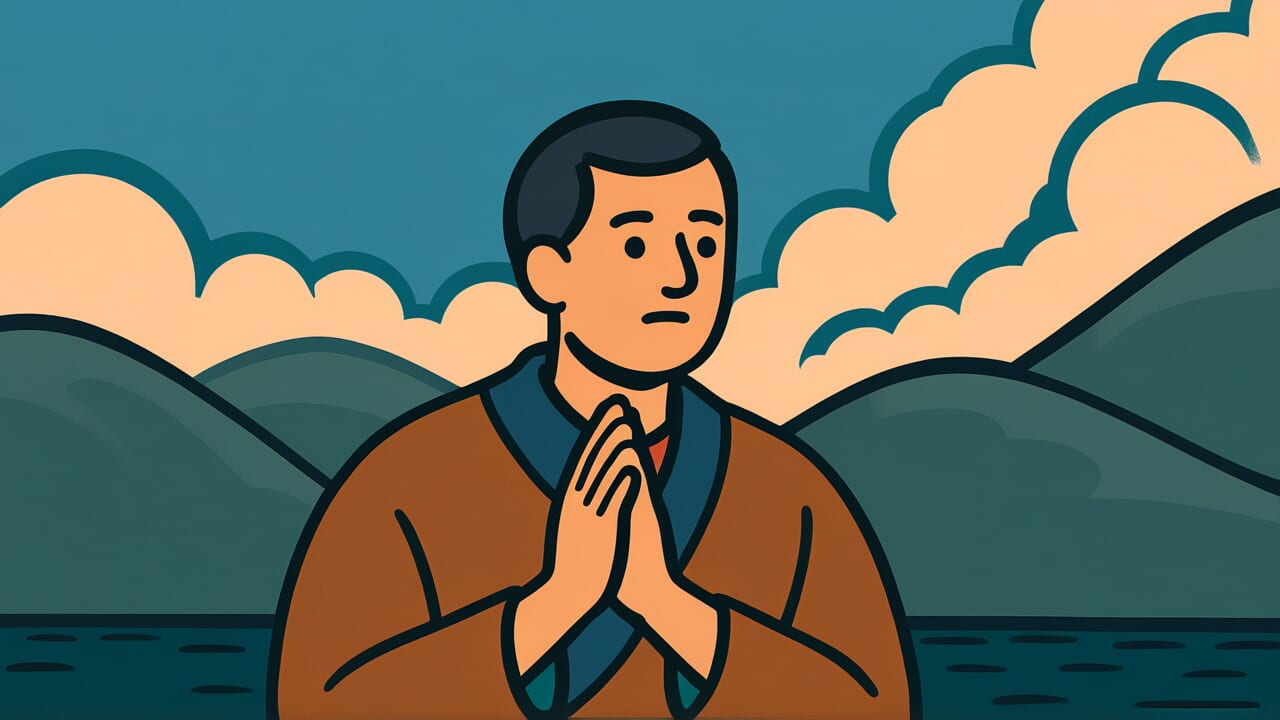How to Read “Praying to god when things won’t work out”
Kanawanu toki no kamidanomi
Meaning of “Praying to god when things won’t work out”
“Praying to god when things won’t work out” means turning to gods or Buddha for help when you face a difficult situation that you cannot solve on your own.
This proverb describes a common human behavior pattern when people feel cornered. Even if you don’t usually think much about gods or Buddha, you naturally seek help from something beyond yourself when facing uncontrollable situations.
These situations might include illness, accidents, exam failures, or losing someone important. When you cannot control what happens, you look for help from a higher power.
This expression is still widely understood today. Students buy good luck charms at shrines right before exams. People pray for recovery from illness. Business people wish for success in important deals.
The desire to rely on something beyond logic remains the same across time. This proverb doesn’t criticize human weakness or desperation. Instead, it accepts such behavior as natural and understandable.
Origin and Etymology
No clear historical document records the exact origin of this proverb. However, we can make interesting observations from how the phrase is constructed.
Let’s focus on the expression “kanawanu toki” (when things won’t work out). The word “kanawanu” refers to situations beyond your control. It describes moments when human effort and wisdom cannot reach, when all options are exhausted.
Then comes “kamidanomi” (praying to god). This combination reveals something important about Japanese thinking.
Throughout Japanese history, people valued self-reliance and hard work in daily life. Whether farming or running a business, the basic principle was to work hard with your own hands.
At the same time, people recognized the existence of natural forces and fate beyond human understanding. Typhoons, droughts, and epidemics showed that some things remained beyond human control no matter how hard people tried.
This proverb likely emerged from both humility about human limits and strength to keep hoping. People normally work hard on their own, but when truly desperate, they seek help from gods and Buddha.
This isn’t laziness. It represents both human weakness and strength.
Records of common people’s lives during the Edo period show this pattern. People worked honestly in daily life but visited shrines and temples during illness or disasters.
This proverb captures that Japanese spiritual attitude in a simple phrase.
Usage Examples
- I didn’t study at all for the exam, but as “praying to god when things won’t work out,” I went to a shrine to pray for success
- When his condition worsened and even doctors were puzzled, the family went to receive prayers as “praying to god when things won’t work out”
Universal Wisdom
The proverb “Praying to god when things won’t work out” reflects both essential human weakness and strength at the same time.
Humans are rational beings. We can make plans, work hard, and solve problems. But we are also beings who know our own limits.
No matter how hard we try or how much wisdom we use, some things remain impossible. When facing that reality, people want to rely on something.
What’s interesting is that this proverb doesn’t reject “praying to god.” Rather, it accepts this as a natural human response.
No one is completely rational, always calm, and never shows weakness. Wanting to cling to something when cornered isn’t shameful. It’s proof of being human.
This explains why this proverb has been passed down for so long. Humans try to be strong, but sometimes need to admit weakness.
We believe in our own power while sensing something beyond ourselves. This duality makes us human.
Our ancestors may have affirmed complete humanity, including weakness, rather than perfect strength.
When AI Hears This
Humans normally choose a guaranteed 1 million yen over a 50% chance of 2 million yen. This is typical “risk avoidance.”
But when the situation reverses, something changes. When choosing between losing 1 million yen for sure or a 50% chance of losing 2 million yen, people suddenly gamble. They take uncertain bets rather than accept certain loss.
Kahneman and Tversky’s experiments quantified this tendency. Humans feel the pain of loss about 2.25 times stronger than the joy of gain with the same amount.
The pain of losing 100,000 yen is more than twice the joy of gaining 100,000 yen. So when loss approaches, people cling to choices they’d normally consider foolish to escape that pain.
Even praying to god, with extremely low success probability, looks like hope for avoiding loss as long as it’s not zero.
The sharpness of this proverb lies not in criticizing prayer but in pointing out the psychological distortion of remembering god only when cornered.
People behave rationally when things go well but lose judgment in loss situations. This cognitive asymmetry was understood by ancient people through experience.
Modern behavioral economics simply proved it with formulas.
Lessons for Today
This proverb teaches modern people the importance of freedom from perfectionism.
Modern society is filled with pressure that “you should solve everything by yourself.” We tend to carry all responsibility for work, relationships, and health alone.
However, this proverb offers a different perspective. Humans have limits, and sometimes relying on something is necessary.
If you face an impossible situation now, that’s not shameful. Admitting that some problems cannot be solved by your power alone isn’t weakness. It’s depth of self-understanding.
Whether you pray to gods and Buddha, consult someone you trust, or seek expert help, the form differs. But borrowing power beyond yourself is human wisdom.
What matters is balancing regular effort with asking for help when troubled. This proverb affirms both.
Working hard in your own way while honestly saying “help me” when needed. Such flexibility may become the strength to live in the coming era.



Comments